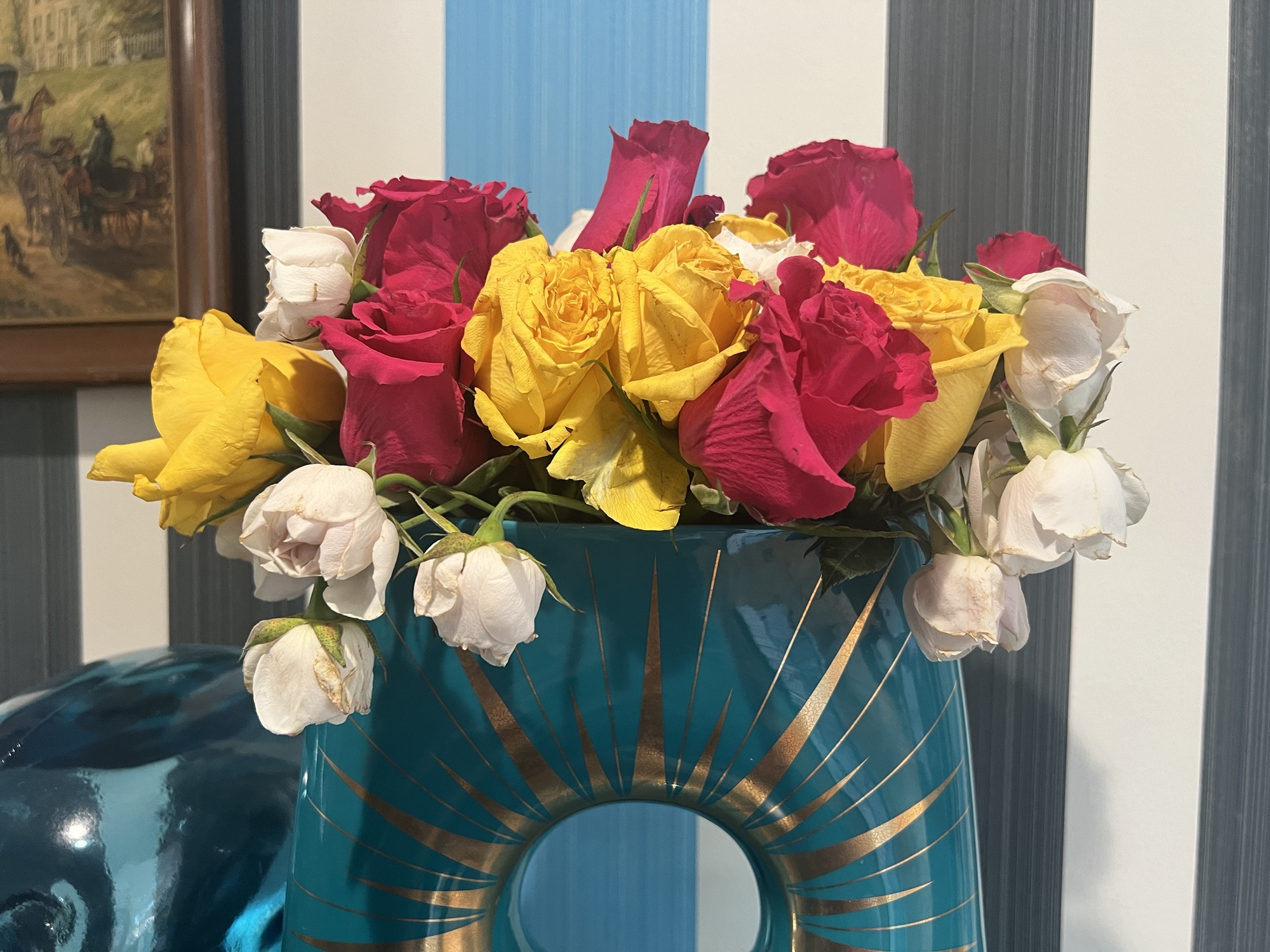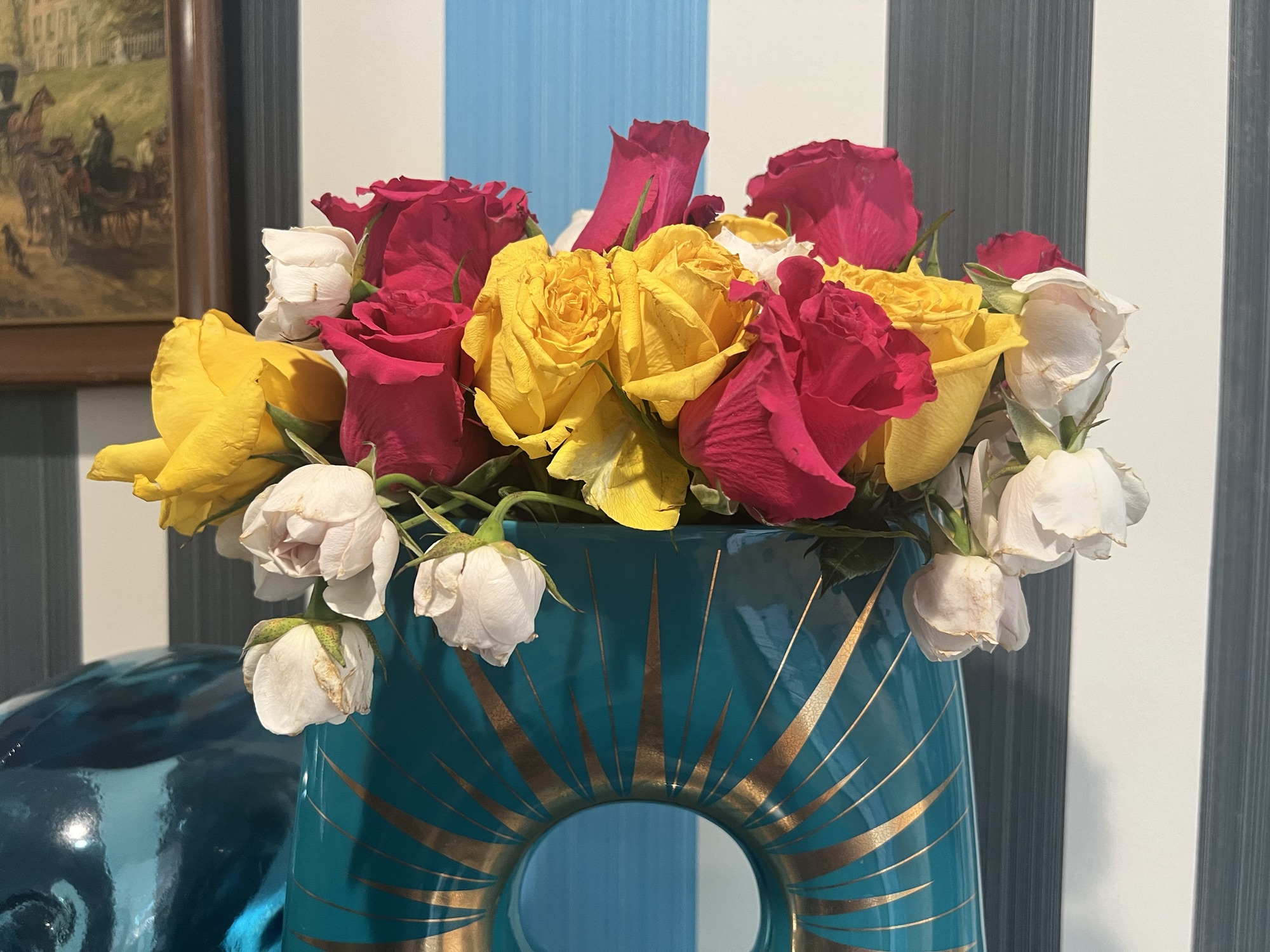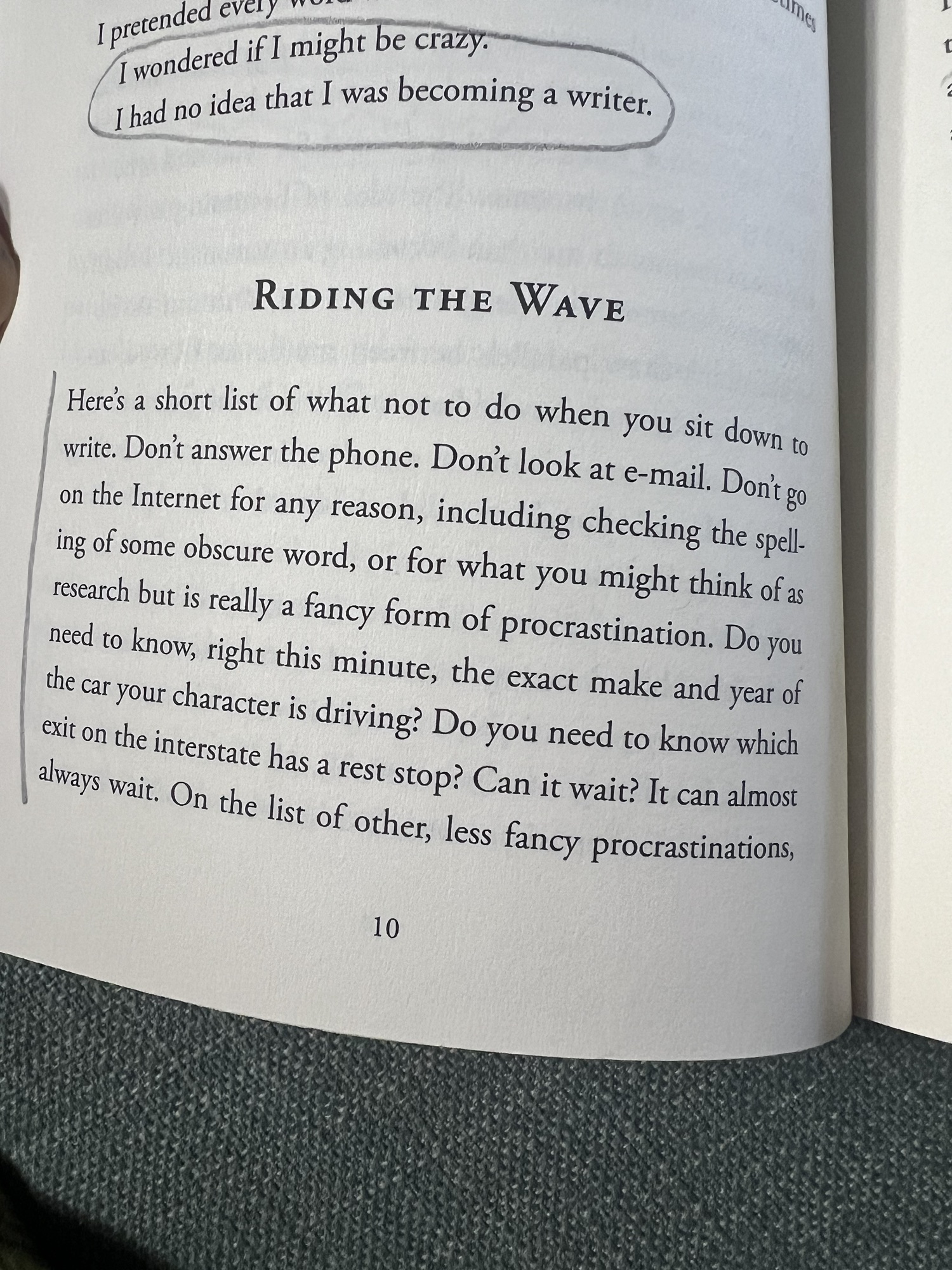Cut the Roses

I’ve written before about a good friend of mine, a neighbor who’s pushing eighty.
This friend does a little somethin’ that’s familiar from my punk rock days called dumpster diving, and loves to share the spoils.
My family members can expect to open our front door to a gift at their feet about once a week. A crinkled brown grocery bag full of assorted day-old bagels. Not-quite-expired milk. Quite-expired cream. New York Posts from days past that stain our fingers grey as we pick them up, sometimes with a comment scrawled in pen under the headline. Once, a caddy of colorful washable markers. And, very often, cut flowers with tanned, curled edges on their petals: the first signs of wilt.
The Thought Counts
The best part about these gifts…aren’t the gifts.
Rather, it’s that he can’t really sneak them onto our doorstep. Our dog alerts us to visitors, as do cameras that make our phones emanate with twinkling sounds when motion sensors are tipped off. We’re able to catch him in his act before he shuffles back to his truck, and we’re then mutually gifted with a nice conversation.
On this particular day, we were running late to drop off my oldest son when we saw Jerry outside of our next door neighbor’s house.
“We’re dropping T off, come back later today! Good to see you!”
When we returned home, my youngest kept asking, “When will Jerry be back? I want to know what he has in his truck today.”
Precious Moments
I encouraged my son to flip on some TV so I could get in writing time—it had been a long day of no school, adventures and activities. But when I sat in front of my computer, queued my writing playlist and settled in to my writing nook, my phone began to chime.
A few taps on the screen later and I’m watching Jerry’s paced and labored bending to place dozens—4? 5?—of roses in different colors on the stoop.
I think of the writing.
I take so few moments to write.
It’s hard to get started. Here I am, actually doing the thing. I shouldn’t stop, should I?
I recall my young son’s questioning, his anticipation for another visit, then hurry down the stairs and into the playroom.
“Jerry’s here!”
His eyes widen, he pops up from his dent in the sofa, pressing pause with his little index finger. “Jerry’s here?!”
We head to the front door to greet him before he can get back into his truck. We talk, we laugh, I remind Jerry that his parking is bad and his driving is questionable. I tease him about refreshing the bed of his truck a bit more often, as I imagine empires of microscopic life intermingled with his finds that have been left out in the rain. We say our goodbyes and head inside. I’m thinking of my writing, how lucky I am to resume with time to spare before I clock back in to my mom-taxi gig.
E looks up at me, with light shining in his deep brown, almond-shaped eyes as we take the steps to our front door.
“Want to make something with me? Do a project?”
I think of the writing.
I think of his offer.
As I turn the door handle, I tell him: “Of course I want to do a project with you.”
Hesitancy
Later, after things were created, showers were taken, bedtime stories were told and kisses goodnight were exchanged, I went to the kitchen to continue my nightly routine. There I was greeted by the pile of once-discarded roses, sitting in a heap of stems, leaves, rubber bands, cellophane and small, crinkly packets of flower food.
When I’m feeling particularly sour, it feels like Jerry’s gifts are another task I’m receiving on an already-filled plate. The bagels take up quite a bit of room in the trash bin, and even if they were palatable to me there are always far more than a family of four could swallow. If multiple bags come a week, they can fill up our trash bin quickly.
I don’t want to walk to the other side of the house and place bagels no one asked for in the trash bin. I don’t want to rinse out this plastic bottle of cream for recycling. I was ready to be asleep, not ready to cut and arrange flowers! I have so much stuff I want to get rid of that gifts of more stuff are generally reminders that I’ll have to be responsible for getting rid of said stuff ethically later. It’s tiresome.
This particular night was one of those. I thought of tossing the flowers out of my side door, to trash in the morning. What did it matter? They were trash once before. It changed nothing in the scheme of things. My husband is allergic to roses. What about the writing? I was tired. I could choose less and skip this task. No one would know, no one would care.
A voice within me said, “Just cut the damn roses.”
Giving Care
I queued my evening task playlist and cut through the first cellophane wrapping. One by one, I picked up a stem, snipped it, pulled off the flowers, and placed it in the vase. It’s monotonous. It’s tedious. It’s meditative. It’s calming. It’s worth it.
I let myself bask in the moment I was making. My shoulders lower, breath deepens. The act of caring is a form of catharsis. Some petals need to be plucked, removing the early signs of imminent decay. It loves me, it loves me not, I place it into the flower pot. And again.
Making Things Better, Little by Little
What does it matter?
If something won’t last long, why bother?
It’s already been thrown away once.
I don’t fault myself for this initial mode of thought. The “why bother?” mindset brings me back to when I was thirteen, reading The Bell Jar by Sylvia Plath. The protagonist, depressed and hopeless, wondered: What’s the use of taking a bath, if you’ll just have to do it again tomorrow? Depressed, hopeless, and a little crust punk myself, this resonated with me deeply at the time.
I’m not hopeless anymore, but I still stumble in answering that question: why bother?
When I pause, I know the answer. Bother is a verb that can be replaced with care. How was I, neglected, abandoned, still a child, supposed to know the importance of something I wasn’t receiving? How was Plath, burdened by overwhelm as she cared for two young children whilst her husband cared not at all for her?
Care is a Gift that Gives Back
You get as much, if not more, in return when you give care. This doesn’t only apply to people returning a favor. The instant favor is the way it feels to be present and caring, whether it’s for a child, a dying cut flower, or a plastic bottle full of expired cream.
A thankless job is only that which is done without consideration. Gratitude is a force that can grow internally—we are not limited to receiving thanks from external influences. We’re not reptilian. We have the ability to create our own warmth and sustain ourselves from it.
I’m thankful that I treated the once-discarded flowers with respect that they deserve. I’ve watched their swan song for nearly a week now, some of their necks bent in defeat, their colorful blossoms too heavy for their weakened frame.
And they’re still beautiful. Bright, brilliant. Worthy.

What About the Writing?
The artist’s life is one which is in a state of constant interruption. When my phone momentarily morphed into a wind chime, I thought of an excerpt from the book I’m currently reading, Still Writing by Dani Shapiro.

She goes on to list a plethora of other tasks whose pull will take you away from your writing, many of which are home care and social tasks traditionally assigned to women, who, in our society, experience a disproportionately brawny pull away from their art.
What she doesn’t mention amongst this list is loving. Answering the door when an elderly neighbor is sneaking around again. Creating an engineering project with your kindergartener. Honoring the value of flowers past their prime.
I think of a recent read, Baby on the Fire Escape: Creativity, Motherhood, and the Mind-Baby Problem by Julie Phillips, where the author examines the personal lives of world-renowned artists, authors, and poets who were mothers. Some abandoned their children in one form or another, while others were able to utilize the resources more readily available to them to achieve success in both family life and their artistic pursuits. That is the life I want.
Creation
My children, my relationships—these are my creations, too. An interaction is when an individual is both the sculptor and the clay, and the relationship, a separate entity to mold. This applies to my interactions with nature and objects without sentience as well. I choose how I show up, how I interact, how I sculpt.
I will sculpt artfully, impassioned, without abandon.
Because if I’m present, I will miss nothing. As writers, it is our job not only to imagine, but to witness. How are we to witness if we’re not in the room?
Dani Shapiro, Still Writing: The Perils and Pleasures of a Creative Life
I will not think of life as a distraction from art—neither are a side dish. Life is the main course, art, the salt. Salt is an essential nutrient used to embolden flavors. Pursued on its own isn’t recommended—it will leave you with a bad taste in your mouth.
[…] for the moment it’s being experienced. Once you move your thoughts away from appreciating a wilting flower, it is not wabi-sabi anymore. Wabi-sabi is just as impermanent as the materials it […]
[…] Get the hidden spots. Do the regular maintenance. Make the repairs. That’s how I cherish material items. I respect and care for them. […]
[…] “What am I doing with what I’ve got?” This is a helpful frame of mind. I can’t treat all things with the respect and care if there are too many. […]